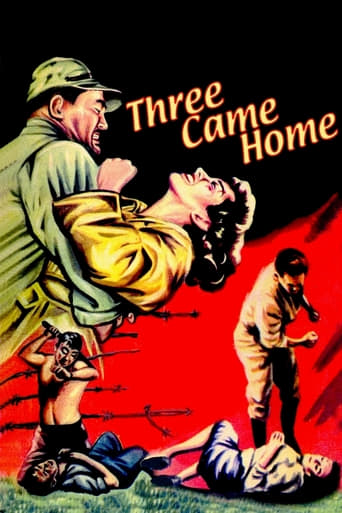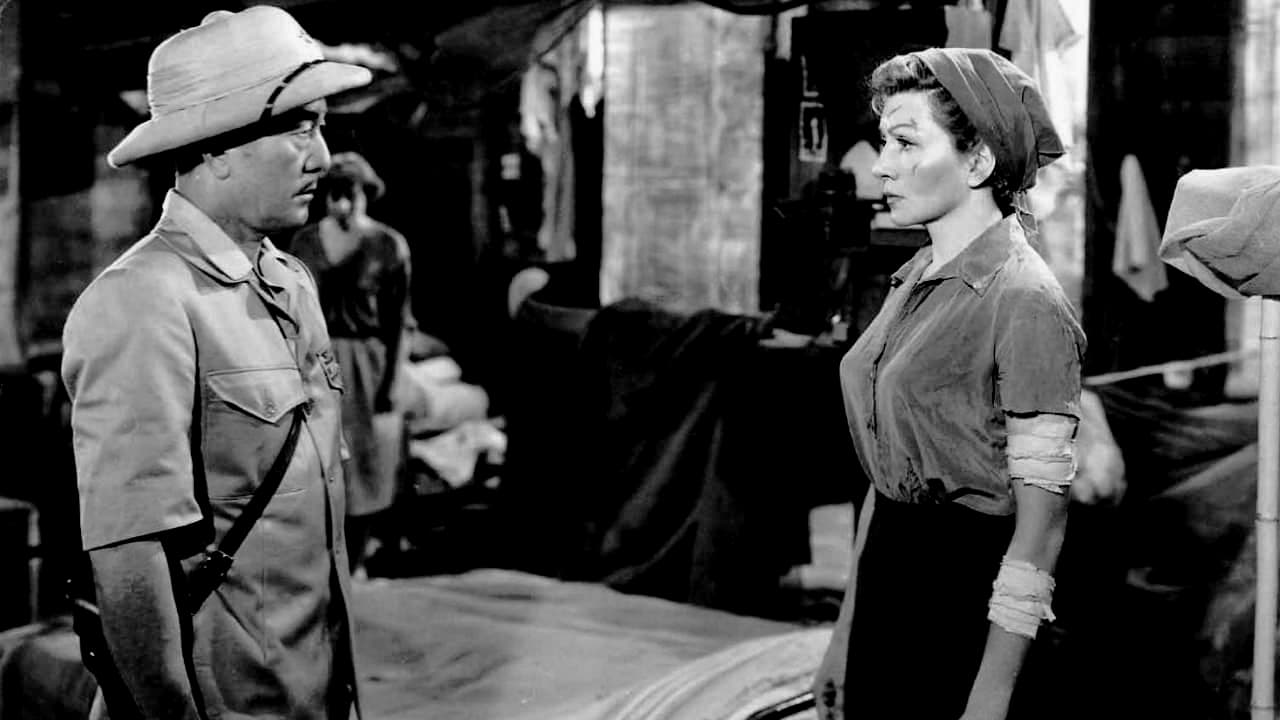Robert J. Maxwell
The story of Claudette Colbert, her husband Patrick Knowles, and their young child during the Japanese occupation of Borneo shortly after Pearl Harbor in 1941. In précis it looks pretty ominous. The brutal Japanese, the sobbing women, the starving children, the constant insults and beatings. And this is, after all, 1950, probably written and shot mostly in 1949, with the war a short four years behind. It was less than a decade earlier that the war-time movies had been calling the Japanese "bandy legged monkeys" (Robert Taylor in "Bataan") and calling for them to be "wiped off the face of the earth" (Henry Hull in "Objective Burma.").Well, the authoress of the book this is based on can be glad she wasn't a Chinese woman when the Japanese occupied Nanking in China, true enough, but this film is more nuanced than any other I can think of from the period. It's, well, it's credible. Japanese prison camps were much harder on prisoners than the German Stalags. The Japanese were equally hard on their own warriors. The aviation cadets at Etajima endured a long and strenuous training program and were beaten routinely with sticks for errors. Late in the war, officers on Chichi Jima ate the liver of decomposing American corpses. Not that they enjoyed it; they were half drunk before they could bring themselves to do it. It was a demonstration to the men that even the most disgusting acts could be overcome with courage.At any rate, the Japanese, let by Colonel Sesue Hayakawa, separated men and women into different camps but nobody ate any livers. The Japanese guards followed orders implicitly, and when Hayakawa was absent, one of them rapes Colbert and later twists her arm brutally to get her to sign a fake admission. But they're not the raving maniacs of "Purple Heart." And Hayakawa is a horse of a different color; a nice guy, literate, understanding, a graduate of the University of Washington, who enjoys children and grieves when three of his own are killed in Hiroshima.It's rather surprising to find the Japanese being treated so evenly in a film from the 1950s. They're not "good" but they're not "bandy legged monkeys" either. They're just believable.Hayakawa delivers a fine subdued performance and it's certainly Colbert's most notable dramatic role. It's worth catching -- an adult movie about the war, when most of Western cinema was just recovering from a long spell of enmity.
vincentlynch-moonoi
This is a rather remarkable film because it is a basically true story, and much of it was filmed in locales where it actually took place.Made in 1950, it is rather faithfully based on the memoirs of Agnes Newton Keith. It tells the story of her family's ordeal of being civilian POWs of the Japanese after the Japanese invasion of what is today Indonesia. Keith and her young son were interned at a camp in Sarawak, which was not liberated until September, 1945. Her husband had been a British official in the region and was interned at a different camp for men.None of us can imagine what it must have been like for the Brits taken prisoner, but this film gives one a pretty good idea. As I watched the film several things occurred to me. First that these women and children -- at least according to this film -- had to live much as many "locals" live in southeast Asia today "upcountry". I lived in Thailand for a while, and when I visited my partner's village in 2010, I saw conditions much like some depicted in this film. Of course, it is different when you are prisoner. I also detected racial tension, though subtle, in this film.Surprisingly, the most touching scenes of the film were when the Japanese camp commandant learns this his entire family was killed in the atomic bombing of Hiroshima, and he takes 3 of the British children to his temporary home near the camp for a sort of picnic.As always, Claudette Colbert was excellent here, as was Sessue Hayakawa, who plays a very different role than his character in "The Bridge On The River Kwai".This is not a film I want on my DVD shelf, but it is very good.
blanche-2
Claudette Colbert stars in "Three Came Home," a 1950 WW II drama also starring Sessue Hayakawa and Patrick Knowles. It's the true story of Agnes Keith, who endured almost four years in a Japanese prisoner of war camp in Sandakan, Borneo with her little son when the Japanese marched into Borneo in 1942.Unlike many Hollywood WW II films, this one is fairly unrelenting in its depiction of beatings, shootings, attempted rape, going through the garbage for food, malaria, and, in the case of these women, many of them not knowing what happened to their husbands. It also captured the fear and pain of the women leaving theirs family home and having no idea where they're being sent and if any of them will ever see their husbands again."Three Came Home" sticks as closely to Agnes' real story as possible, with the usual dramatic license. In reality, the family was in Canada when war was declared, and Harry, Agnes' husband, was ordered back to Borneo, where he worked for the government. The couple was separated, but not the whole time - Harry eventually was imprisoned at the later camp in Kuching. Their son George was an infant, having been born in 1940.In real life, Keith was criticized for being "too polite" to the guards, by an older woman in the camp - this is alluded to in the film. It was also understandable, since she needed to provide for her son. She did occasionally receive extra food and medicine for him. Sessue Hayakawa, the head of the camp, is an admirer of Agnes' from reading one of her books. It is his depiction of a humane man that takes "Three Came Home" out of the realm of good guys/bad guys. Hayakawa gives a beautiful performance as an American-educated soldier with family difficulties.But the star is Colbert in a workhorse role. She is magnificent - dignified, desperate, protective of her son, and resolute. Though she is thought of as a great star today, I wonder if she isn't perhaps underrated because of the classic comedies she did. Also, as an actress, she never made it look difficult, though it was, and she had a strong commitment to her work. This film lost her the part of Margo in "All About Eve," as the back injury she suffered during one of the beating scenes prevented her from doing the role. Sadly, because of her age - 43 when this film was released - "Three Came Home" was actually her last lead in a major film.After the war, the Keiths had another child, a girl; Agnes died in 1982 at the age of 80, and Harry died the same year. Agnes' story is one of survival, heroism, and determination, well conveyed here, thanks to a strong script, strong performances, and beautiful direction by Jean Negulesco.
ctomvelu-1
Thank God for Fox Movie Channel. Claudette Colbert gives yet another shining performance as a WWII POW in THREE CAME HOME. The Japanese intern her, her son and husband from 1941 until war's end. Based on a real account by a published author of the time, the movie is pretty gritty for 1950, and includes a reasonably realistic attempted rape and some 1950s-style beatings, which means no blood and no real "contact" as various female POWs are slapped around and kicked while they're down. The legendary Sessue Hayakawa plays a colonel who befriends Colbert's educated and compassionate character, and he lives to lose his entire family in the flames of Hiroshima while she is reunited with hers at the end -- hence the title. Shot in decent quality B&W. While the Japanese overlords other than Hayakawa are depicted as brutal, they are not the drooling, ravenous, bucktoothed sadists of a typical WWII-era movie (and which they were probably like in real life). Most of the cast is British, although the film is a Hollywood job, albeit shot overseas for a better sense of authenticity. Suggested for all those who like a good character study, which is what this movie is all about.



 AD
AD




